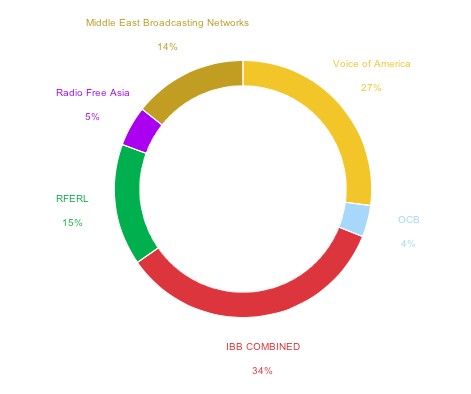BBG Watch EXCLUSIVE
On the eve of the Town Hall to Introduce CEO John Lansing, scheduled for Tuesday, October 20, a group of Broadcasting Board of Governors (BBG) employees, who do not want to be identified because they fear retaliation from longtime BBG managers, prepared an open letter to the new agency head. In their letter, BBG employees warn John Lansing about the expansive International Broadcasting Bureau (IBB) bureaucracy which many of them blame for making U.S. international media outreach, especially the Voice of America (VOA) where some of these BBG employees work, “practically defunct,” as described by Hillary Clinton when she was still U.S. Secretary of State and an ex officio member of the BBG.
FY 2015 BBG Budget Allocations

OPEN LETTER FROM A GROUP OF BROADCASTING BOARD OF GOVERNORS EMPLOYEES TO NEW CEO JOHN F. LANSING
Unfortunately, the bureaucracy of the International Broadcasting Bureau (IBB) was again gaining momentum even as you, Mr. Lansing, were walking into the Cohen building as the new Broadcasting Board of Governors CEO. As Andy Lack experienced it earlier, you are now surrounded by IBB executives and their prodigies who are either failed managers or largely foreign to international journalism and international media.
We are presenting our views anonymously to avoid retaliation from the executives you have inherited because we know that they are capable of such retaliation. Do not be surprised if during the Town Hall some employees may be reluctant to criticize the management responsible for the agency being ranked by the Office of Personnel Management (OPM) next to last in employee satisfaction and trust in leadership. On the other hand, BBG employees are desperate and look to you for righting the ship and turning this agency around.
We hope that this letter will offer you a few dos and don’ts. Hopefully, it will allow you to see through management-staged briefings and focus on the essential agency problem – its failed bureaucracy with no strategy.
1. Do define IBB.
What is it?
Is it an oversight body or should it actually provide support functions?
Is it supervisory or is it a service organization?
You can’t mix these two roles.
IBB claims that they are entitled to manage every broadcast entity, but they have failed to support any. In reality, all non-federal entities have their own HR, Legal, Budget, Contracting, Marketing, Communication and Security supports. Support for VOA and OCB is worst than deficient.
2. Do check into the IBB budget details.
$64 million-plus in addition to $175 million for the Office of Technology, Services and Innovation!
Compare these IBB expenditures with grantees’ spending on similar functions?
Why are IBB costs so much higher?
Since IBB mostly supports VOA and the Office of Cuba Broadcasting (1280 full time positions), its support is costing the BBG about $47,500 per one VOA/OCB full-time federal staffer. When IBB and IBB’s Office of Technology, Services and Innovation budgets are combined — $239,000,000 — the cost for one full-time VOA/OCB staffer rises to over $186,700. Even if BBG grantee employees are added, for whom IBB provides minimal support but imposes upon them countless bureaucratic requirements, the cost per employee is still astounding.
These comparisons may explain why some top IBB executives and managers can afford to travel, mostly internationally, 10 times more than an average VOA/OCB staffer/reporter.
3. Do connect IBB functions with deliverables.
Are they necessary?
Are they meaningful?
Are they supporting USIM’s core mission and its media products?
As IBB executives have supervised themselves for many years, there has been no accountability associated with their poor performance.
The ranks of IBB bureaucracy and senior executives are growing. These executives create new bureaucratic functions, just because they can. Their reach continues to expand. Bureaucratic requirements being invented by IBB personnel are also constantly growing.
4. Do verify IBB output and quantity/quality/timeline of their performance.
It generally takes several months before a VOA or OCB job can be posted; several months before a reprimand letter can be issued; several weeks before funded requests can be processed; several years before a legal dispute can be resolved.
Some service and support requests are never addressed. VOA and OCB folks are forced to wait; they must wait for IBB because they have no other options.
5. Do visit broadcasters in all entities
Hear about their ideas, thoughts, and challenges directly.
These editors, hosts, producers, reporters, videographers and writers are the brains and the soul of this agency. Listen to them.
What are the barriers obstructing their work?
Why is their morale so low?
How can it be improved?
6. Don’t let IBB staffers manage your day-to-day activities.
Hire brand new executive staff who hopefully will not turn out to be pro status-quo bureaucrats.
IBB’s failed managers, especially on the federal side, are waiting for their second, third or fourth chances. They should not be allowed to take charge again.
7. Don’t trust strategic documents.
BBG has only paper strategies. IBB strategists have no vision, minimal regional/international expertise, minimal media experience, little knowledge about industry practices or market realities abroad, only superficial understanding of U. S. foreign policy and U. S. strategic interests, and no skills of presenting strategies to stakeholders.
IBB had proposed to eliminate VOA Russian radio and TV broadcasts and to close VOA Georgian Service on the eve of the Russian invasion of Georgia in 2008; IBB proposed to drastically cut VOA Chinese and Tibetan broadcasts in 2012 at the time of worsening human rights in China, and increasing numbers of immolations in Tibet; IBB proposed to eliminate Balkan services during the Russian annexation of Crimea in 2014 to save less than 3 million dollars; IBB this year again proposed to cut VOA Afghan broadcasts when violence from extremist groups continues to plague Afghanistan and the Afghan President warns about increasing ISIS operations in Afghanistan.
A list of failing IBB strategies and recommendations is a very long one; some IBB proposals, thanks to the Congress, were rejected.
8. Don’t accept the rosy picture painted by IBB executives.
Examine their deliverables and past performance in the Cohen building. Check to see the average timeline of recruitments, labor issues investigations, getting contractors on board, purchasing equipment and supplies; look at the speed of computers, the setting of the studios, the reliability of content management software; examine the lack of priorities on training.
Take a look at social media outreach development. Check on the lack of diversity at the middle and senior management level in this “21 Century U.S. international media organization.”
Most of the questions are not difficult to get full answers. In the past, IBB took advantage of a divided agency and a blind trust of busy part-time governors.
Mr. Lansing,
We urge you to demand accountability from IBB and other senior executives and managers.
Reduce or eliminate bureaucracies.
Don’t allow IBB to waste more time and money on non-working strategies.
Re-align budget resources to enhance the quality and impact of USIM’s multi-media products to serve truly needy audiences instead of being designed to show a meaningless reach with meaningless content.
###
From: IBB Notices Admin
Sent: Monday, October 19, 2015 1:13 PM
To: IBB Notices Administration
Subject: Town Hall to Introduce CEO Lansing
Town Hall to Introduce CEO John Lansing
Tuesday, October 20
10:00 a.m. to 11:00 a.m. EDT
Cohen Building Auditorium
You are invited to join newly-appointed CEO John Lansing for a town hall on Tuesday, October 20 at 10:00 a.m. EDT. Mr. Lansing will share his initial impressions from his first month in office and offer brief remarks on the five strategic priorities that he outlined at the October 8 BBG Board Meeting. A question and answer period will follow Mr. Lansing’s remarks, during which staff may ask questions and offer their feedback on BBG priorities and the current and future state of U.S. international media.
The Town Hall meeting will be available on the house RF channel 46, as well as streamed internally, accessible for employees/contractors with an agency (bbg.gov, @voanews.com, etc.) email address.
To join the meeting:
Go to URL: http://live.newrow.com/show/wsy-876
Enter password: OctBBG
Enter your full name and agency email address to join.

Comments are closed.